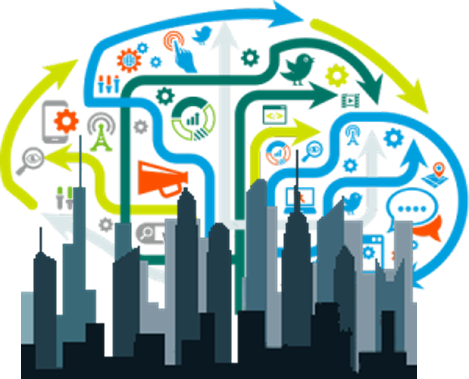“Netflix, Google and Facebook were all spawned with machine learning built into their DNA,” writes Dr. Olly Downs (@mathandporsches), Chief Scientist behind Amplero, a self-learning personalization platform built by Globys. “Think about Netflix, and its ability to continually learn about your viewing patterns to then deliver highly personalized recommendations.”[1] You might even say that these large companies were the original digital enterprises — they rely on and continually try to gain a better understanding of big data. Downs continues:
“Companies like these have invested heavily in machine learning technology from the moment they were founded. Vigilantly gathered data is constantly fed into algorithms that drive the delivery of highly targeted content, emails and even phone conversations to consumers. For these companies, machine learning is a strategic asset that’s absolutely core to their business.”
Pierre Nanterme (@PierreNanterme) and Marty Cole, respectively Accenture’s Chairman/CEO and Group Chief Executive for technology, believe that digital information is going to be core to every business in the years ahead — not just the Googles and the Netflixes. “Technology is intertwined in nearly every aspect of business today,” they write, “with information technology fast becoming a primary driver of market differentiation, business growth, and profitability. … Every business is now a digital business.”[2] If every business is, in fact, a digital business, then a series of questions asked by Downs is important: “What if your company isn’t a tech behemoth? What if your company grapples with a legacy data system that’s nowhere near capable of uncovering the types of discoveries critical to being able to formulate and target optimal customer experiences? What if machine learning capabilities may be valuable for your company, and strategic, but aren’t accessible?” Here’s the big question: Is your situation hopeless? The simple answer is: Of course not. Downs puts it this way, “The good news is that if you weren’t born a fish, you can still learn to swim.”
The technology that is making machine learning available to most businesses is cognitive computing. That’s because cognitive computing utilizes natural language processing that makes the man/machine interface easier to use. The Enterra Enterprise Cognitive System™ is a perfect example of the kind of technology involved. When we talk to clients, we note that when an organization has an analytic problem, it typically has to assemble a team of three experts:
- A business domain expert — the customer of the analysis who can help explain the drivers behind data anomalies and outliers.
- A statistical expert — to help formulate the correct statistical studies, the business expert knows what they want to study, and what terms to use to help formulate the data in a way that will detect the desired phenomena.
- A data expert — the data expert understands where and how to pull the data from across multiple databases or data feeds.
Having three experts involved dramatically lengthens the time required to analyze, tune, re-analyze, and interpret the results. The Enterra® approach empowers the business expert by automating the statistical expert’s and data expert’s knowledge and functions, so the ideation cycle can be dramatically shortened and more insights can be auto-generated. Even some of the business expert’s logic is automated to help tune and re-analyze the data. Automating expert knowledge is important because, as Bozhidar Bozhanov explains, “The hardest part of machine learning is the part where a human tells the machine what is important about the data. This process is called feature selection. What are those features that describe the data in a way, that the computer can use it to identify meaningful patterns.”[3] Downs explains that too many companies give up too early on their attempts to implement machine learning solutions.
“Many marketers will say they’ve tried machine learning and it didn’t work. However, it’s more likely that all the right pieces weren’t in place. Usually, the company has one — or both — of the following issues:
- The company’s data isn’t set up in a way that’s amenable to applying machine learning techniques. Today, most companies are still focused on data warehouse initiatives where data is aggregated and the richness is in the form of averages and scores. The primary motivation is efficient data storage rather than maximizing the fidelity of the data retained. The issue is that there’s then no ability to investigate nuanced customer behavior in order to discover and leverage new insights.
- Machine learning is not integrated into the company’s business operations. Too often sophisticated modeling takes place but is not part of a closed loop process. In other words the process for learning is not tightly connected to the process for taking action. As a result, getting business impacting results is very difficult.”
Cognitive computer systems sit atop legacy systems and can help integrate data so that machine learning can be integrated into a company’s business operations. Downs concludes, “By leveraging well designed algorithms and the computational power of today, companies of all sizes and types can realize the transformational effect of machine learning — even if they weren’t born a machine-learning company.” Every company needs customers and Lori Alcala (@LoriAlcala) believes that machine learning can help you attract and retain customers.[4] She writes:
“In today’s digital economy, consumers have quick recourse if they’re not happy with a company’s services: turn to social media, move to a competitor or simply disappear without a trace. When a customer ends a relationship with a company — otherwise known as churn — the potential for increased profits is lost.”
Downs told Alcala how machine learning can help address the churn problem. “Traditional models take a row of attributes from the customer, and use the current values of those attributes to predict the probability of a customer churning,” Downs told her. “On the other hand, by continually looking across a sequence of events, scoring and rescoring the customer, marketers can better determine at which point a customer is likely to churn.” Because cognitive computing has democratized access to machine learning, Downs concludes:
“Today, major industries have been able to deploy big data platforms that are designed from the ground up to support machine learning techniques. As a result, companies are able to test thousands of marketing messages and automatically determine and execute what’s best for each customer at the right time. What’s exciting is seeing these companies grow into their own — and make use of machine learning to strengthen relationships with consumers and set new benchmarks for business results.”
If your company has yet to figure out how machine learning can help transform it into a digital enterprise, now is a good time to start.
Footnotes
[1] Olly Downs, “If You Weren’t Born a Machine-Learning Company, Can You Become One?” Huffington Post, 16 September2015.
[2] Pierre Nanterme and Marty Cole, “Every Business is a Digital Business,” Accenture Technology Vision 2013.
[3] Bozhidar Bozhanov, “Getting Started with Machine Learning,” Java Code Geeks, 1 December 2014.
[4] Lori Alcala, “Can Machine Learning Help You Keep Your Customers?” CMS Wire, 2 October 2015.





